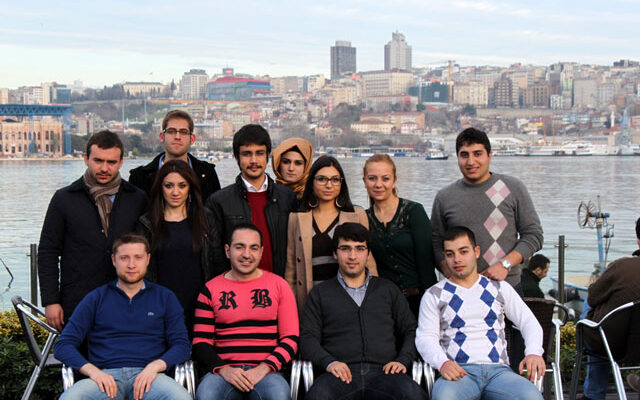
In pictures: Armenian and Turkish students sign a cooperation agreement
ISTANBUL – The Armenian National Students Association (ANSA) and the Student Council of Turkey (SCT) have expressed their readiness to cooperate on representation and protection of the students’ educational, social, economic, sports and cultural interests as well as to advocate students’ rights.
On 21 January, ANSA and SCT signed a preliminary agreement entailing cooperation in the sphere of higher education. Bilateral events and exchange programmes will be organised to follow-up on that vision with the aim of raising awareness about the mutual recognition of professional qualifications and degrees. As this agreement is still preliminary, it awaits validation of the general assemblies of both unions that act as their highest governing bodies.
Students attended a commemoration march
ANSA and SCT expressed their willingness to cooperate at the 63 Board Meeting of the European Students’ Union (ESU) held in Malta in the beginning of December 2012. At the meeting, ANSA was accepted as the newest member to ESU and SCT was given a candidate status, meaning that ESU is currently reviewing SCT’s application to join ESU.
A delegation from SCT went on a three-day visit to Yerevan on December 17 2012 where the two parties discussed setting up a platform for an Armenian-Turkish student dialogue and foster relations between the countries. Roughly a month later, delegates from ANSA returned the visit by going to Istanbul where they participated in a five-hour commemoration march dedicated to Istanbul-Armenian thinker and journalist Hrant Dink. A panel called “An honourable dialogue for a Fair Memory” was organised on 21 January in Galtansara University where participants discussed their ideas for the future relations between Armenia and Turkey.
Important to implement the Bologna Process
“The Republic of Armenia and the Republic of Turkey joined the Bologna process several years ago. By signing the Bologna Declaration our countries committed to completing the implementation of the main principles of the Bologna Process, aiming at raising the role of the students’ participation in higher education policy process. We highly appreciate the fact that our countries are part of the European Higher Education Area and I can also mention that Armenia hosts the secretariat of the Bologna Follow Up Group until 2015,” says ANSA’s Vice-Chair Sargis Asatriants. This also gives a strong impetus for both organisations to cooperate on the level of national student self-government bodies and towards further integration in ESU.
Karina Ufert, Chairperson of ESU, welcomes the intention of Armenian and Turkish students to cooperate. “This is an interesting example on how grass-root movements can step aside from the national context and work together on matters of joint interest. I am glad to see our colleagues in Armenia and Turkey place so much emphasis on the implementation of Bologna reforms, such as fostering mobility, recognition of professional qualifications and degrees and strengthening students’ participation, all of which are topics very close to ESU’s heart,” she comments.




— END —
For more information, please contact:
Karina Ufert, ESU Chairperson: +32/473.669.892 // karina@esu-online.org or Robert Hlynur Baldursson, ESU Communications Manager: +32/473.669.894 // robert@esu-online.org

The European Students’ Union, headquartered in Brussels, is the umbrella organisation of 47 national unions of students from 39 European countries. ESU represents and promotes the educational, social, economical and cultural interests of students at the European level. Through its member unions, ESU represents over 11 million students in Europe. To find out more about ESU, follow us on Twitter @ESUtwt, check out or Facebook page or visit www.esu-online.org. ESU celebrates its 30th anniversary in 2012.
